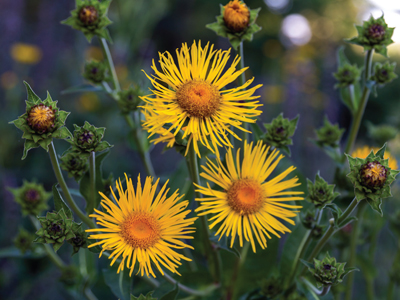Elecampane
Inula helenium – root
Elecampane is a specific for irritating bronchial coughs, especially in children.
It supports expectoration of mucous – the mucilage has a relaxing effect supported by the essential oils so the expectorant action is accompanied by a soothing action and an antibacterial effect.
The bitter principle also stimulates appetite and digestion.
Actions
- Expectorant
- Spasmolytic
- Anti-inflammatory
- Antitussive
Indications
- Respiratory disorders including deep seated respiratory infections; persistent, congested, stubborn wet or dry coughs; tuberculosis; bronchitis; whooping cough; the common cold, influenza and other respiratory infections; fever with chills; swollen lymph nodes
- Weak, stagnant digestion, to support healthy gut flora (prebiotic), excess gas, intestinal parasites, nausea, diarrhoea, peptic ulcer
- Urinary and pelvic stagnation
- Convalescence and malnutrition
Contra-indications and Cautions
No known toxicity.
It is traditionally known as a uterine stimulant to promote menstruation so its use is not recommended in pregnancy.
Administration and Dosage
The analysis of contents below is a guide only, product specific data including expiry date is with the item in the shop.
Inula helenium 1:2. Each 1 ml contains 500mg of dry herb.
Liquid extract in 45% ethanol. Use 20 to 40 ml weekly.
Our clinic uses fluid extracts from Optimal Rx, Herbal Extract Company, Nutrition Care, Mediherb or Sunray Botanicals, in this order.
Notes
The genus Inula has diverse biological activities including anticancer, antibacterial, hepaprotective, cytotoxic, and anti-inflammatory properties. Various species are distributed in Asia, Europe and Africa.
The Eclectics recommended it for coughs and colds, pulmonary irritation and chronic bronchitis.
In Greek mythology, Helen of Troy, was said to have been the most beautiful woman in the world is said to have carried this flower in her hair as she was abducted from her homeland.


